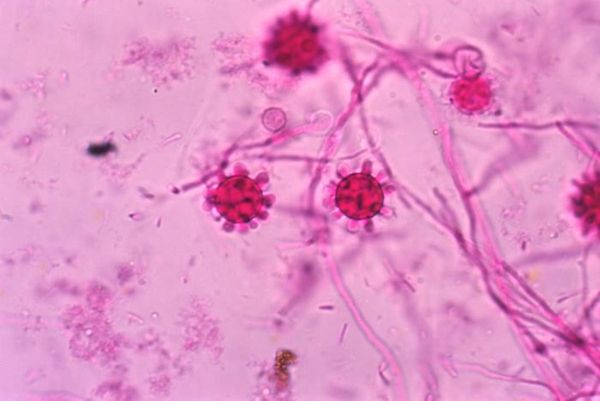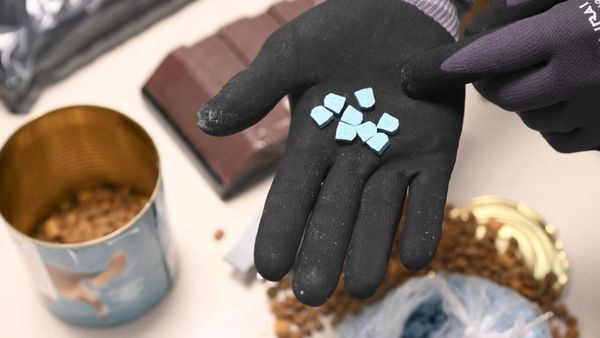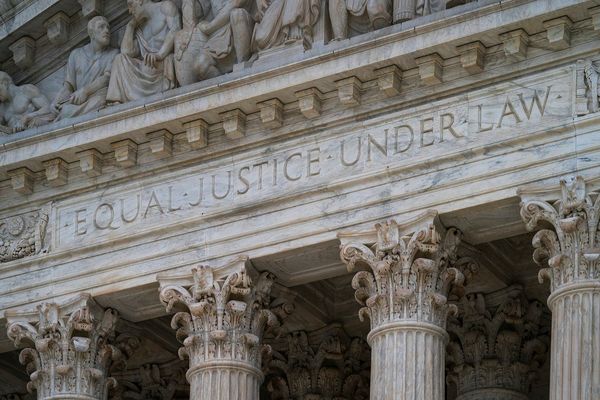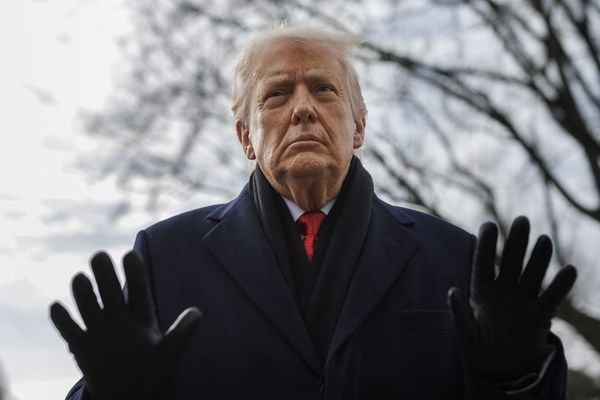
An Israeli strike killed six Palestinians in the occupied West Bank on Sunday, four of whom were brothers. The attack took place in the city of Jenin and left a total of seven dead, including an Israeli police officer. As the family of the brothers buried their “martyrs”, others are still waiting for the remains of relatives held by the Israeli army to be returned.
She doesn’t cry. She doesn’t speak. Ibtesam Darwish simply looks stunned. “I wasn’t just their mother, I was their friend,” she says. “We were so close.”
Sitting in her neighbour’s courtyard in Qabatiya, a city in the northern occupied West Bank, she waits for the remains of her sons.
Twenty-two-year-old Rami, 24-year-old Ahamed, 27-year-old Hazaa and 29-year-old Alaa were killed along with two others in an Israeli airstrike near the entrance to Jenin at 6am on Sunday in an area called Martyr’s Triangle. A seventh person died of their wounds later that day.

The Israeli military said the strike targeted “Palestinian gunmen” who had lobbed explosives at troops, according to The Times of Israel. But eyewitnesses at the scene said the young people who gathered were unarmed and were trying to keep warm by a fire when the strike took place. They added that the attack happened as Israeli forces were withdrawing after a night of violent clashes with the Jenin Brigade, an armed wing of the Palestinian Islamic Jihad movement, and that a soldier had been killed.
Finding out on social media
Ibtesam knew her boys weren’t at home. They wanted to watch the Israeli military raid on the Jenin refugee camp.
“Early in the morning, I saw that there had been a drone attack and that four members of the same family had been killed,” she says softly. “I called them immediately but nobody picked up. I left them a voice message asking them to call me back straight away,” she continues.
“It was on social media that I found out they had been killed.”
The first thing she did was to go to the local hospital. In a video posted on X, she is seen walking into a ward asking: “Have they all gone? Is there anyone left?” With the support of one of her other children, she lifts an emergency blanket and finds horror. One of her sons lies lifeless, his body mangled from the explosion. Ibtesam lets out a muffled scream.
{{ scope.legend }}
© {{ scope.credits }}A few hours later, it’s time to say goodbye. The crowd in the Qabatiya courtyard begins to swell. Dozens of women wait in silence as the men congregate outside. The sound of cars arriving, halting, then driving off is incessant. Residents of Jenin and Qabatiya come in waves to attend the funeral or to give their condolences to Ibtesam. The boys’ father, who works in Jordan, is not present. In Islam, funerals are typically conducted within 24 hours of the deceased’s passing. If the death took place in the morning, the funeral must be held before sunset. If it took place at night, the funeral happens the following morning.
As the sun burns warmer, the atmosphere becomes suffocating. Only the clicking of cameras can be heard. Ibtesam, the mother of seven boys and two girls, explains how death is a part of everyday life in the occupied West Bank.
“That’s life for us Palestinians. We go out in the morning without knowing if we’ll be back in the evening,” she says in a matter-of-fact tone. “I have three sons left. If they kill them, we’ll make more. We will continue to resist.”
Suddenly, the silence is broken by gunshots. The funeral procession draws nearer. Men’s voices are heard shouting the Takbir – “Allahu akbar!” ("God is greatest" in Arabic) – followed by a “la ilaha illa Allah!” ("There is no God truly worthy of worship except Allah"). More shots are fired, this time in rapid succession, almost deafening.
The bodies of Hazaa, Rami, Ahamed and Alaa are all wrapped in the green flag of Hamas. A Palestinian keffiyeh covers their heads. Then, one by one, they are laid on the ground. A dense crowd surrounds the four “martyrs”, a widely used term to describe Palestinians killed by Israeli soldiers, whether they were militants or not.
More shots are fired, over and over again, to commemorate the dead. Men dressed in black, their faces hidden behind balaclavas, hold M-16s and other assault rifles. Among the crowds are militants from various brigades of the Jenin refugee camp. A sea of flags is waving, some clenched in the hands of young children. White for the Jenin Brigade, green for Hamas, yellow for Fatah – the party that heads the Palestinian Authority – and the red, black, green and white of the Palestinian flag.
Time seems to stand still. As prayers and gunshots continue to fill the air, the four bodies are lifted up and carried by the men in the crowd. Ibtesam groans in pain, watching the procession walk away with her sons. She will not be going to the cemetery. According to Muslim tradition, women do not attend the burial of the deceased. The women who had come to support her flock towards her and weep. But Ibtesam does not. She was able to say goodbye to her children.
Withholding remains, a form of ‘collective punishment’
Jamal Zubeidi was not. His son Mohammed, or “Hammoudi” as he called him, is yet to be buried. He was killed on November 29 by Israeli forces during a raid on the Jenin refugee camp. Considered a senior Palestinian Islamic Jihad operative by Israeli intelligence service Shin Bet, the remains of the 27-year-old were taken away by soldiers.
Shin Bet claims that Mohammed Zubeidi was involved in the planning of a terrorist attack that killed one person close to the Hermesh settlement in May last year, as well as another in June that killed one civilian and wounded four soldiers.

Israel has a long history of withholding the remains of Palestinians suspected of or having committed terrorist attacks. “The bodies of terrorists are detained in accordance with orders given by political authorities,” explains an army spokesperson contacted by FRANCE 24.
“Twenty years ago, it was kind of an undeclared policy. But now it’s official,” says Jessica Montell, director of the Israeli human rights organisation HaMoked. “We represent several families who are waiting.”
The practice was authorised by Israel’s Supreme Court in 2019 and is also used by Hamas or Hezbollah in Lebanon for the remains of Israeli soldiers.
“It’s a bargaining chip for future negotiations,” says Dror Sadot, a spokesperson for B’Tselem, the Israeli information centre for human rights in the occupied territories. “There were periods when the policy was used and others when it wasn’t. The number of bodies concerned is also very vague.”
Between 1991 and 2008, Israel agreed to hand over 405 bodies in return for the bodies of deceased soldiers, according to data collected by B’Tselem. The National Campaign for Retrieval of the Bodies of Martyrs launched by the Jerusalem Legal Aid and Human Rights Center (JLAC) estimates that the remains of 450 bodies are being kept in Israeli cemeteries and mortuaries, 47 of which were killed since October 7. According to JLAC, 2023 was a record year with 101 bodies detained, only 22 of which were returned. The Gaza Strip is not included in these figures due to lack of access.
For both B’Tselem and HaMoked, withholding Palestinian remains is a form of “collective punishment”. Zubeidi feels the same. “It’s a punishment to make us suffer even more,” he says from the Jenin refugee camp still marked by the scars of the nighttime raid. “They think it will deter the militants.”

Hopes of a swap
Denying families the right to bury their loved ones is a source of undeniable anguish. Whether Palestinian or Israeli, religious or secular, funeral rites allow people to mourn. But without a body, that becomes impossible.
“His grave has been dug. It’s waiting for him,” says the father of nine. Two of his sons have been killed by Israeli forces and another is currently in administrative detention. “I want to bury him, and visit him, but I have no body. I have no proof. How do you expect me to accept that he’s dead? I hope he isn’t. We need to see him to believe it.”

Zubeidi hopes he will be able to retrieve Mohammed’s remains thanks to a potential exchange between Hamas and the Israeli government. Negotiations to free hostages held in the Gaza Strip since October 7 could see Palestinian detainees released and remains returned on both sides.
Hints of sadness and fatigue cover the 60-year-old’s face. Zubeidi himself has also spent time in Israeli prisons.
“We’re like all families, we’re scared for our children all the time,” he laments. “We’re sad because he’s dead, but we’re proud that he died a martyr. Freedom is paid for in blood.”
This article is a translated version of the original in French.







